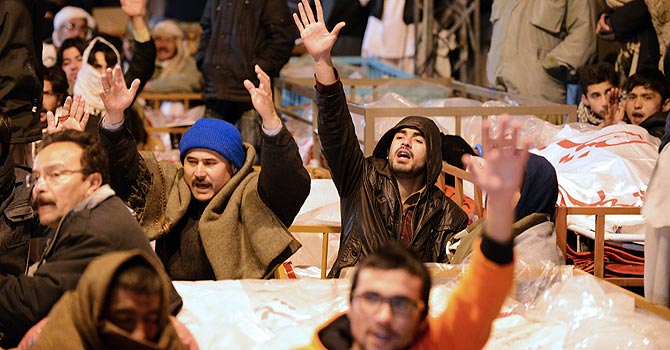
QUETTA: A suicide blast at a snooker club on Alamdar Road, a Hazara dominated area of Quetta, left eight people dead on Thursday, January 10, 2013. As ambulances arrived at the scene along with media persons and volunteers, another blast took place claiming 106 innocent lives including tv reporters, policemen, volunteers and peace activist Irfan Ali plus injuring 200 more.
Thousands of mourners including women gathered on Alamdar Road alongside the dead bodies of their loved ones and refused to bury the corpses for four days unless their demands were met.
The dead were finally buried after the government sacked the provincial government – but that measure was far from meeting the demands of the protestors.
What were the demands?
“It's very simple: we want security. No more dead bodies,” said Ejaz Ali—Irfan Ali's uncle who stayed with Irfan Ali’s coffin for three days.
“We already expected him (Irfan Ali) to be there at the site of the blast and giving a helping hand, so I called him and he said he was busy giving first-aid. After a few minutes we heard another explosion...this time he didn't pick up his phone.”
“His left hand was missing and his face was unrecognizable. We recognized him from his hair and jacket,” Ejaz added.
“He worked day and night for peace. Lately he was a bit hopeless but he was determined to continue fighting for peace...and he died for it. But we will not give up. We are proud of him and we will accomplish his mission, god-wiling,” he said.
“Everybody knows about the killers and their whereabouts. They have been proudly claiming responsibility for such attacks and vowed to continue their attacks. Their statements are being published in the media all the time,” Ejaz stated.
Not unlike previous attacks on the members of Hazara community, a banned militant outfit, Lashkar-e-Jhangvi, called the local media and claimed responsibility for the attack and even vowed to launch more attacks “we had warned them to leave Pakistan last year but it seems as if they love their properties more than their lives. So now we are not going to even let them escape,” read the LeJ statement published in a local paper on January 11, 2013.
While gruesome attacks against the Shias dramatically escalated in recent years, the Hazara community has suffered the most due to unwillingness of the government and security forces to rein in the terrorists. Some have even pointed fingers at the security establishment for giving a free hand to the sectarian terrorist outfits such as Lashkar-e-Jhangvi and its affiliates.
“They want to paralyze our community educationally, economically and psychologically through a planned and very systematic terror campaign. It's not just killing people. Our officers are being forced to leave their jobs. Our businesses are being closed. We are being compelled to sell our properties on throwaway prices and leave,” Ejaz said.
The situation in Balochistan in general and that of Hazaras in particular is very pathetic. In spite of the presence of huge security and intelligence agencies, the banned militant outfits carry out their attacks in broad-daylight with impunity and confidence. This has resulted in a perception that the authorities were either unmoved by the atrocities committed against the Hazaras or unwilling to react.
“The authorities are responsible for all of this. One should not expect a terrorist not to terrorize. It's the state's responsibility to protect its citizens. Are the law enforcement agencies afraid of a bunch of terrorists? If yes, they should all resign. If not, then they must be allied with the terrorists—which is more likely. In either case, they have no right to rule,” Ejaz explained as to why he was hopeless.
A relative of one of the victims at the sit-in demonstration, Mehdi Hassan, standing beside the dead-body of his 4o-year old uncle, Shah Hussain, said, “Lashkar-e-Jhangvi hideouts are known to all. The government, military establishment and even judges are afraid of the terrorists but we are not. They will not be able to kill each and every one of us.”
Among the dead bodies was Mirza Hussain's as well. Hussain was a Hazara policeman who, with his colleagues, had reached the blast site to secure the area. His 33-years-old brother, Ramazan Ali, demanded that “the killers be brought to justice”.
“We will only believe we are protected if they arrest and hang the killers,” he said.
The author is a freelance journalist and human rights activist from Quetta. He can be reached at dr.saleemjavid@gmail.com










































